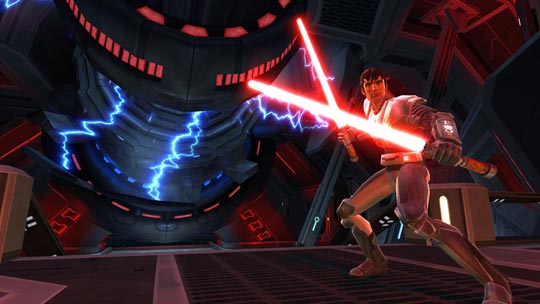About two years ago I vowed to never again play an MMORPG. After playing a ton of World of Warcraft for about five years, I had simply gotten sick of that style of game. Not only did the constant influx of content render it a never-ending grind, the MMO genre is so inherently time-consuming that it precluded me from playing any other games. However, back in December and January, I did break that oath briefly.
Though I hadn't been following Star Wars: The Old Republic since it was announced back in 2008, in the months leading up to its launch I started reading up about it, playing in the beta weekends, and checking the game's official site for new media. Naturally, I bought the game pretty much as soon as it launched, and was initially very impressed. In terms of concept and design, I was (and still am) blown away by the steps SW:TOR was taking to shake up the MMO genre. While the basic controls, combat and class roles still follow the precedent set by WoW, the game's emphasis on narrative, and inclusion of classic BioWare tropes like companion characters and moral decisions really hooked me.

As my Imperial Agent Sniper, I felt like a total badass not only through the way the game adeptly handles the standard MMO fare of gearing up and killing hordes of enemies, but also through the dialog and story that bring another (admittedly more compelling) layer to character-building. Facing off with the rebel leader on Balmorra, and posing as the Red Blade were amazing story sequences that rival some of Knights of The Old Republic's best moments.
However, as I really started thinking about the implications of a narrative-heavy MMO, I started having real doubts as to whether or not SW:TOR was worth its hefty time investment. Since so many players are going to be playing through the same content, decisions lack permanence in a physical sense. While the game is wise to utilize seamlessly instanced zones so that you'll never again be able to, say, enter the building you blew up in a cutscene, there are a number of simpler annoyances. For instance, you'll be able to run through an area littered with the respawns of mobs that you killed hours ago in order to crush an uprising, or you'll see the guy you told to get out of town in order to avoid certain death simply standing idly where you first found him, waiting to give his quest to others just like you. While someone who is playing through the game more as an MMO than a story-driven RPG might be totally fine with these narrative inconsistencies, I was drawn to SW:TOR because of the stories it offered, and suffice to say, issues like these add up to distract from the tale quite a bit.

Discussing permanence on a larger scale is even more troubling. Though I didn't play my cla.ss story through to completion before I canceled my subscription, I've read through several threads and watched a few videos that focused on the Imperial Agent's ending. Without spoiling anything, things can end up quite differently for your Agent depending on your endgame decisions. While that level of divergence is great, my concern lies in how it can possibly follwed up on in later patches and expansions. Surely creating eight lengthy, fully-voiced cla.ss stories was resource-consuming enough as is, and I don't think I could even imagine the ungodly budget required to follow up on each of those stories while taking players' previous decisions into account.
Though that inevitable lack of continuity might be a necessary evil considering the game is an MMO, it's still rather disappointing considering I got into the game pretty much solely on the basis of building a character through story and decision-making. All this shouldn't be seen as a heavy criticism of the game; from a sheer gameplay perspective, SW:TOR is superb, and I can't deny that BioWare's efforts to incorporate a driving plot into an MMO are admirable. However, in the end, the way in which MMOs inherently limit the idea of permanence in regards to the actions of individual players means BioWare is fighting a losing battle in terms of introducing a lasting, divergent story to the genre.